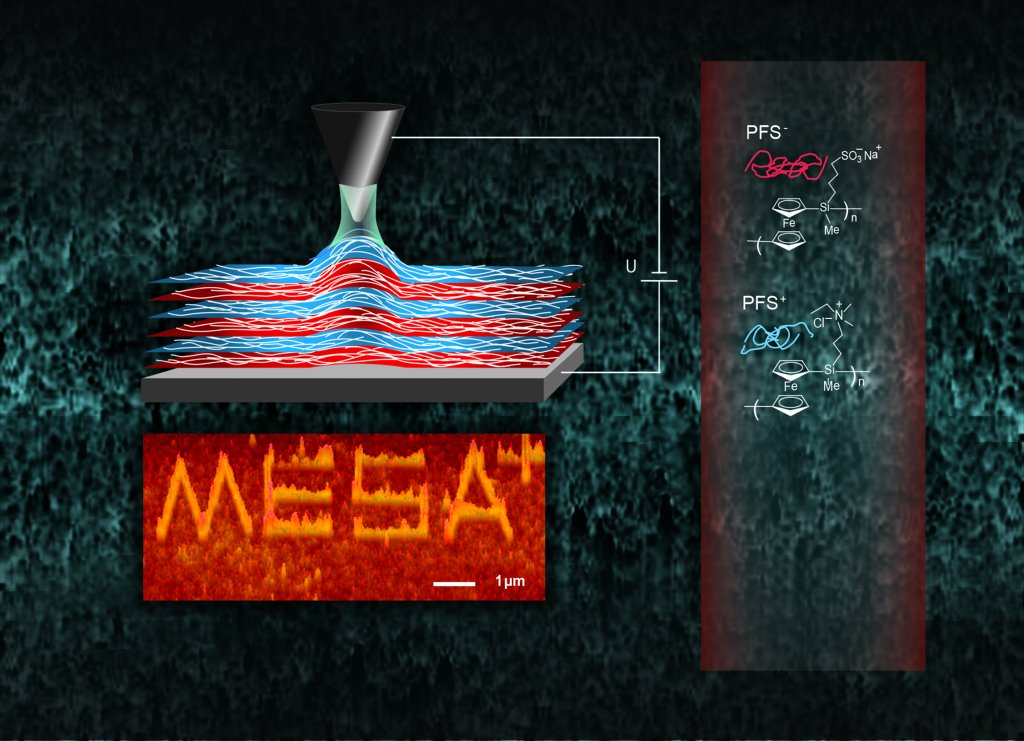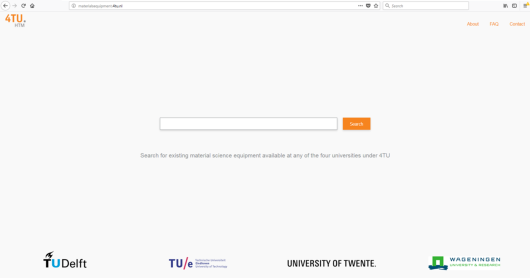4TU.HTM equipment infrastructure - under construction (January 2024)
On the equipment infrastructure website of 4TU.HTM you can find information about equipment related to materials science that is available at Delft University of Technology, University of Twente, Eindhoven University of Technology and Wageningen University & Research. (Right now, only the TU Delft infrastructure and part of the UTwente infrastructure is available.)
http://materialsequipment.4tu.nl
The website should be used in Firefox, Google Chrome or Microsoft Edge. It is not functioning properly in Internet Explorer.
We invite all interested parties to take a look at the available instrumentation and corresponding expertise. For the use of or further details about the facilities, please contact the responsible person.
The information below refers to information already available on the individual websites of the 4TU's. For questions and requests concerning specific laboratories, equipment or experiments, please address the contact information mentioned on the websites.
Materials for Additive Manufacturing (MAM) Lab - TU Delft
Advances in aerospace and energy transition require materials that meet ever-increasing demands. Such as extreme environments, high pressures or temperatures. In TU Delft's Materials for Additive Manufacturing lab, researchers can now explore new materials and process them into products and components for extreme conditions. This unique lab was opened on 30 November 2024 at the Faculty of Mechanical Engineering.
The MAM lab enables the design and production of materials with higher strength and greater energy efficiency, as well as creating complex shapes, reducing the amount of material where needed or even using natural or more sustainable resources. It is a collaboration between the faculties of Mechanical Engineering (ME) and Aerospace Engineering (AE).
Reactor Institute - TU Delft
The Reactor Institute Delft (RID) together with the department Radiation, Science & Technology (RST) has been the Dutch knowledge center for radiation-related research and education for over 50 years. With our knowledge and expertise we play an important role in fundamental and applied scientific research.
The research is in various fields, such as sustainable energy, materials and health, both nationally and internationally. You can for instance think of research in the field of solar cells and batteries and medical isotopes for diagnosis and treatment of cancer.
A short overview of the possibilities of research with use of the reactor or other related instruments: Research Instruments RID.
The Mechanical Testing Laboratory - University of Twente
The Mechanical Testing Laboratory focuses on the mechanical behavior of constructions and the associated material behavior. Also involved is research on material structure, the basis of mechanical behavior, looking from nanometers up to meters. The participating research groups are working with divers materials, like rubber, plastics, metal, composite and biological materials. The experiments and equipment used for measurements for this research are joined in the Mechanical Testing Laboratory and are listed on this site.
The experiments are listed both from A-Z and by research group (Biomechanical Engineering, Elastomer Technology and Engineering, Nonlinear Solid Mechanics, Production Technology, Structural Dynamics and Acoustics, Tribology).
Prof.dr.ir. Ton van den Boogaard coordinates the Mechanical Testing Laboratory.
MESA+ Nanolab - University of Twente
MESA+ has a 1250 m2 state-of-the-art NanoLab which consists of three closely intertwined units: the cleanroom, analysis facilities and the BioNanoLab. Research on the nanometre scale needs a laboratory with extreme specifications, whereas the NanoLab is constructed to meet such high standards. Any influencing effects from the environment, such as vibration and electromagnetic disturbances, are virtually non-existent. The environmental conditions inside the building, such as temperature, humidity and the influence of light are extremely stable.
MESA+ is part of NanoLabNL, a Dutch national facility for nanotechnology research.
Information on the availability of these research facilities can be obtained from the NanoLab website.
TU Delft Infrastructure Database
On the old infrastructure website of TU Delft, initiated by Delft Centre for Materials, you can find information about all research instruments that were available at TU Delft in 2007.
The instruments can be browsed from A-Z, by application, and by location (e.g. Applied Physics, Faculty 3mE, Aerospace Engineering (Aerospace Stuctures and Materials Laboratory), Chemical Engineering, Faculty of EWI, etc.).
This is an obsolete website; an up-to-date overview can be found on the new website: http://materialsequipment.4tu.nl
Research Labs -
Eindhoven University of Technology
"In order to conduct this groundbreaking research, to attract outstanding scientific talent, and to train new generations of engineers, we have state-of-the-art research labs and facilities at our disposal, of which some are unique in the Netherlands, or even in the world."
- Center for Multiscale Electron Microscopy (CMEM)
"The CMEM offers unique facilities for the study of soft materials and uses the knowledge gained to develop synthetic materials."
Contact person (Heiner Friedrich): cmem@tue.nl - Center for Wireless Technology (CWTe Lab)
- Darcy Lab
"The Darcy Lab offers unique MRI facilities specially equipped for researching the properties of technological porous materials."
Contact person: dr.ir. L. Pel - Equipment & Prototype Center
- Future Fuels Lab
"In the Future Fuels Lab scientists are researching green fuels and cleaner combustion methods for engines." - High Capacity Optical Transmission Lab
"The High Capacity Optical Transmission Lab facilitates research on innovative optical fibers and signal processing techniques to enable transmission of ultra-high capacity." - Institute for Complex Molecular Systems Lab (ICMS Lab)
Contact person: dr.ir. I. Voets - Laboratory for Cell & Tissue Engineering
"The Laboratory for Cell & Tissue Engineering facilitates culturing of autologous tissues across the full spectrum of the research field." - Microfab/Lab
"The Microfab/Lab facilitates the development of new micromanufacturing technologies for use in life sciences applications." - Multiscale Lab
"The Multiscale Lab facilitates research on the deformation and failure behavior of composite materials. The insights gained lead to innovative materials."
The Multi-Scale Laboratory of the Mechanics of Materials group of prof. Marc Geers takes a rather unique position as it bridges the gap between traditional materials science and mechanical characterization labs, by integrating mechanical testing with (real-time and in-situ) microscopic observation. With a focus on developing novel (miniature) testing devices and strategies, the lab allows for quantitative in-situ microscopic measurements during deformation and mechanical characterization of a broad class of materials, structures, MEMS, etc., on a wide range of length scales from nanometers to centimeters. Dr. Johan Hoefnagels en Marc van Maris provide the required scientific and technical support for the high-tech experiments conducted in this lab. The lab perfectly fits in the research group's mission, where a symbiosis between computational modeling and advanced experimentation across the scales provides a real scientific thrust forward.
Contact person: dr.ir. J.P.M. Hoefnagels
List of equipment of the Multiscale lab. - NanoAccess
"NanoAccess makes it possible to produce, process and analyze innovative materials with nanometer accuracy, without releasing the necessary vacuum."
Contact person: prof.dr.ir. H.J.M. Swagten, prof.dr. B. Koopmans - NanoLab@TU/e
"The NanoLab@TU/e offers a unique combination of equipment for developing optical chips and other applications based on compound semiconductor technology."
Contact person: dr. H. Ambrosius - SolarLab
"With the facilities of the SolarLab, atomic layers can be applied to solar cells, in a quick, controlled manner, making solar cells even more efficient."
Contact person: prof.dr.ir. W. Kessels - Wind tunnel
"The wind tunnels on the campus of TU Eindhoven facilitate aerodynamic and boundary layer research on static and moving objects, at both small and large scale." - Other Labs
"Next to the 14 bigger laboratories, TU/e hosts another 40 smaller research labs. We have grouped these labs by Department. Should you be interested in cooperation or using these facilities? We have indicated wether facility sharing is optional or not for each lab. For more information please contact the contactperson of the lab."




